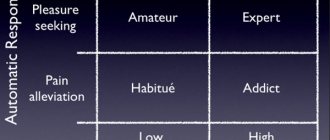Adviсe
- Rational thinking is a process, not a result
- The benefits of rational thinking
- Irrational thinking - feelings and emotions
Rational thinking differs from irrational thinking in that it is based on logically sound arguments and facts for thinking and making decisions. Irrational thinking is an incoherent train of thought that does not have a strictly constructed logical chain and is based on assumptions and feelings. Irrational thinking arises from a person’s desire to believe in his fantasies.
Irrational and its characteristics
If we try to explain the concept of “irrational” from the position of philosophy, then it can be characterized as a certain beginning of human nature, opposite to the property of rationality, i.e. understand this world intelligently. The irrational admits that there are areas of the worldview that the mind is not able to understand, but nevertheless they are acceptable thanks to faith, feelings, and intuition. Thus, the irrational is one of the characteristics of the special nature of reality. Over the years, issues of the irrational have been studied by such famous philosophers as Bergson, Delta, Nietzsche, Schopenhauer and many others.
So to speak, “free” individuals who do not think about the consequences can allow themselves to think irrationally. To act this way is to admit that reality cannot always be understood using scientific methods. Based on the views of supporters of irrational thinking, reality with all its components and derivatives, for example, life and psychological processes, is not subject to generally accepted laws.
Of course, such a position has its place, but in the case of critical thinking it is completely unsuitable. Irrational people strive to understand the laws of existence, violating all generally accepted laws, while rational people, on the contrary, think critically, not trusting what cannot be verified, relying only on reliable and confirmed facts. And, taking this into account, we must say that even if the irrational is characteristic of you, if you want to develop the ability to think critically, you must at least temporarily discard everything that may contradict it.
What exactly is to be discarded? Let's try to clarify this point, because irrational thoughts can be of different types.
Let's summarize
Putting everything together we get the following picture:
You go to the store and stand in line. As the line progresses, your anxiety increases. It is at this moment that you should ask yourself: “why am I scared?” And you are scared because the saleswoman may notice any peculiarities in your behavior (trembling, confusion of speech) and react negatively to them. But here you should think about why she might treat them negatively? After all:
- her thoughts may be occupied with something more important at the moment
- she may not even pay attention to the oddities in your behavior
- even if this happens, there is a very high probability that she will forget about it in a couple of minutes
As you can see, there is nothing to be afraid of. One has only to repeat this procedure as often as possible and the anxiety will gradually begin to recede.
Source: Ellis A. (2001).
Overcoming Destructive Beliefs, Feelings, and Behaviors. Amherst, NY: Prometheus. echo do_shortcode('[rating-system-posts]'); ?>
Typology of irrational thoughts and their influence
Irrational thoughts are thoughts that interfere with an objective and adequate perception of the surrounding reality, and from the position of behavioral psychology, they even cause unreasonable anxiety.
In total, we can distinguish three categories of irrational thinking and the corresponding types of thoughts:
- Exaggeration. This includes thoughts like: “She noticed that I was unsure of myself,” “They definitely thought something was wrong with me,” “He sees right through me,” etc.
- Overgeneralization. This includes thoughts like: “If I was chickening out then, then I’ll be chickening out now”, “He communicates with everyone like that - and he won’t ignore me”, “No one passed this exam - I have no chance”, etc.
- Mind reading. This includes thoughts like: “She thinks I’m angry and conflicted,” “I know what you think about me,” “He realized that I thought badly of him,” etc.
There are other types of similar thoughts, but to one degree or another they will belong to one of the categories of irrational train of thought. Their greatest danger is that they trigger catastrophic thinking: a person plunges headlong into groundless worry and panic, and his ability to make decisions and act is completely paralyzed. There can be no question of any critical thinking here.
You can find topical visual examples of irrational thinking in books devoted to working with it. Here are some options:
- “Think slowly... Decide quickly” Daniel Kahneman
- "Emotional Intelligence" Goleman Daniel
- "Emotional Flexibility" David Susan
- “Problem Solving Using Intelligence Techniques” Jones Morgan
- “Triggers. Form habits - build character" Goldsmith Marshall and Reiter Mark
Here it would be logical to talk a little about how irrational thinking influences what a person does.
As has already become clear, irrational means illogical, unscientific and without any criticism. Irrational actions are aimed at obtaining a result, but the actions themselves are not thought out or evaluated in advance. There are no meaningful options for the development of events, resolution of issues or solutions to problems in advance.
All this, as a rule, has a very direct connection with the spontaneous manifestation of feelings and emotions that irritate or calm thoughts. Irrational individuals can observe manifestations of reality beyond the limits of their logical explanations, and also tend to believe unconfirmed facts simply because they dominate others. Such people neglect to use the so-called life instructions, i.e. thoughtful behavioral strategies and action algorithms. The basis for this behavior in most cases is a person’s belief in a positive outcome, even if he completely does not understand the practical basis and reasons for success if it is achieved. Most often, success is explained by luck or favor of fate.
But from a practical and even more so from a critical position, either a very spiritual person or a child can allow themselves to behave this way. In addition, when thinking or drawing conclusions, it is effectively guided by the rule of conservation of energy, and thinking irrationally, simply relying on patterns and the first information received, is less expensive in terms of time and effort. But if knowledge based on upbringing or experience is irrational, nothing good will come of it.
Here is just a small list of factors that hinder effective thinking and correct actions - irrational thinking:
- Spontaneously and without reason
- Leads a person away from the right thoughts
- May interfere with a person's daily activities
- Reduces efficiency in professional and other areas
- Often activated when it is not needed
- Causes irritability, depression and anxiety
- Disrupts adaptation to the outside world
- Not flexible
- Causes the development of perfectionism
- Produces fear of public speaking
- Produces fear of communicating with authorities and more knowledgeable people
- Reduces motivation to achieve new results
- Can make a person feel lonely
- Causes problems in personal, social and professional life
- Creates dependence on other people and public opinion
- Promotes the development of bad habits
Behavioral psychology, and even banal everyday experience, suggest that the sooner a person realizes the irrationality and illogicality of his thoughts and actions, the faster favorable changes will begin to occur in his life: the number of negative events and mistakes will be reduced, his psyche will become stronger and his resistance to stress, personal productivity and efficiency will increase, and a critical approach to information processing will be formed.
It is wrong for a sane person to think irrationally. But this obstacle to the development of critical thinking can only be overcome when the reasons for its appearance are known. And it’s worth talking about them in more detail.
Replacing irrational thoughts with more rational ones
The last step will be to gradually replace your negative thoughts with more objective ones. I’ll say right away that the result will come gradually and quite slowly (judging from my own experience). And at first, constantly analyzing your thoughts can cause some discomfort. However, in order to achieve the desired effect, you need to do this daily so that this process quickly becomes a habit.
Here are some examples of more real and objective thoughts than those given above: “It’s not a fact that the saleswoman could notice my trembling hands. Even if this happened, I'm sure she didn't pay attention to it. Her thoughts are now occupied with something completely different,” “If I blushed last time when answering in front of an audience, this does not mean at all that now everything can happen again.”
Causes of irrational thinking
To begin with, it is worth saying that behavioral stereotypes are often laid down in early childhood. They are necessary because not only save energy and time for making decisions, but also contribute to initial adaptation to life and society, ensuring the survival of the individual. But upon reaching adulthood, a person begins to encounter “failures”, i.e. with problems with irrational thinking. The main reasons for this are the following:
- Not all mental patterns and mechanisms formed in childhood turn out to be correct
- Not all thought patterns and mechanisms that are suitable for a child are suitable for an adult
Irrationalism is a disorder of thinking. Subsequently, this leads to problems of adaptation to the surrounding reality. In addition, destructive basic attitudes are formed in the human mind, namely:
- Excessive demands on oneself (I should do this, I shouldn’t do that)
- Excessive demands on the environment (they should do this, they shouldn’t do that)
- Catastrophization (if this happens, it’s the end, horror, death, catastrophe, everything is lost, etc.)
- Low frustration tolerance (I won’t be able to survive this, this is the end for me, etc.)
Adding up all the thoughts above, the output we get is something like: “In no case should I stumble during my speech. If I suddenly stumble, they should not make fun of me. But if this happens, it means the end for me, I won’t survive it.”
In reality, the variety of thoughts can be much wider, but if you discard all unnecessary things, you can always see the standard mechanism of irrational thinking, working each time in different situations in a modified form. By the way, such a scheme often causes all sorts of human fears.
Any problem, any phenomenon or process, when confronted with which a person experiences psychological discomfort, can be disassembled into elements in order to find the main irrational scheme that causes fear, anxiety, panic and other manifestations and disrupts interaction with the outside world.
In simple terms, someone who is unable to distinguish between fiction and truth, as well as find cause-and-effect relationships, is using irrational thinking. It will never help you predict events or calculate the results of your actions, which is why spontaneous actions and unnecessary experiences arise.
But rational and critical thinking to some extent also includes an irrational, one might say spiritual, component. For example, people of art, creating unique works, often contradict logical laws, although they act deliberately. However, the irrational should not dominate the mind of a sane person, and its manifestations can and should be fought.
How to deal with irrational thinking
Overcoming irrationalism is not easy, but with due diligence and systematic training it is quite possible. It's just important to know what to do. There are many ways, and now we will introduce them to you.
1
Definition of irrational thoughts
Identifying irrational thoughts is difficult only at the first stage. Often they appear in the head very quickly and automatically, they appear as if out of nowhere, and it is almost impossible to catch them consciously. For this reason, the task can be simplified: get yourself a notebook, where throughout the day and every day you will write down thoughts that can cause you negative emotions, anxiety and worries. With practice, it will become easy to determine their appearance, because... your brain will be trained and adapted to it.
2
Establishing objectivity of thoughts
When you are calm, relaxed and nothing is bothering you, ask yourself the question: “How objective are my thoughts?” For example, today someone didn’t want to communicate with you, and you immediately started thinking up God knows what. But look at the situation critically: maybe he was just tired and out of sorts? And if you showed a little timidity when communicating with someone, will that someone really have a negative opinion of you?
To become more aware of the bias in your thoughts, use a simple technique: look at the situation from a new perspective. Those. if you see a person exhibiting the same timidity, do you immediately think badly of that person? And if you don’t want to communicate with someone at the moment, does that mean that you don’t like him? Most likely, this is not the case at all. Always evaluate the situation from several sides, and life will become much simpler and more interesting.
3
Replacing the irrational with the rational
Another method is the systematic replacement of irrational thoughts with rational, more objective ones. But you can expect tangible results only after some time. At the first steps, psychological discomfort may be felt, but it must be bravely overcome with daily training. Gradually, the new habit will take hold and enter your comfort zone.
Here is an example of good thoughts that can replace irrational ones: “It’s quite possible that he didn’t notice my timidity,” “It might have seemed to me that she didn’t want to communicate,” “Yes, they most likely didn’t even think about me,” etc. P.
If we summarize these three methods, we can draw the following conclusion: for example, in a few minutes you will have to make contact with an unfamiliar person. The time before the meeting is getting shorter, and your anxiety is getting stronger. And now is the time to ask yourself why you are scared. Most likely, the fear is due to the fact that your future interlocutor may notice some peculiarities in your behavior: a slightly hesitant voice, a slight trembling of your hands, etc., which is why he will have a negative image of you. This is where critical thinking skills come into play:
- The interlocutor’s thoughts may be occupied with something else at the time of communication
- The interlocutor may not notice the peculiarities of your behavior
- Even if the interlocutor notices something, he is unlikely to analyze it, and after a few minutes he will already forget about you
You can see for yourself that there is really nothing terrible. Irrational thinking plays a cruel joke. But with regular implementation of such a procedure, anxiety states will gradually begin to recede and lose strength.
Here are a few more good techniques for dealing with the irrational that behavioral psychology offers us:
4
Don't go to extremes
When assessing a situation, try to avoid extremes like “this is definitely bad”, “only this is good”, “this is the end”, “one way or not at all”, etc. There are several ways to overcome such thoughts:
- Eliminate extreme words such as “never” or “always” from your vocabulary. Stop using these terms to refer to yourself, the people around you, and the world in which you live.
- Accept the fact that there are no bad or good people, bad or good situations. In any person and in any situation, if desired, you can find advantages and positive aspects.
- Give up categorical thinking. Sometimes it is better to accept yourself along with your shortcomings and weaknesses than to convince yourself and others of their absence. Often this helps justify your behavior and thinking.
5
Avoid catastrophic thoughts
By exaggerating the scale and significance of the problem, you make things worse for yourself. When talking about something unpleasant, you shouldn’t give “not very good” the form “nightmarish.” It’s easy to change your attitude towards problems and troubles:
- Think about the fact that the problematic situation, although not good, does not at all lead to inevitable death and the collapse of all hopes
- Try to compare the problematic situation with something truly terrible, for example, the death of someone close to you, or how homeless or unjustly imprisoned people feel
You can also try to calm yourself down:
- “In fact, there’s nothing wrong with it to worry so much.”
- “Yes, it’s unpleasant, but life doesn’t end there”
- “In any case, everything will work out”
- “No one has ever died from this”
6
Think objectively
If you notice that you are prone to exaggeration and irrationalism, and often imagine dire consequences for even minor problems, practice thinking objectively:
- Life presents not only trials, but also joyful events, and a black stripe will always be followed by a white one
- Even if the outcome of a situation may be bad, its probability is extremely low
- Why worry about something that didn't happen? Most likely, nothing bad will happen, and worrying is just a waste of energy
- Simulate different scenarios and then predict the probability of each of them occurring
7
Mentally relax
Many people often have the thought “I can’t do this anymore.” But this is typical of irrational and insecure people. To overcome irrational thoughts, you need to reformulate your belief and convince yourself that, despite the difficulties at the moment, after a while you will feel better and you will solve your problems.
And, summing up this section, all that remains to be said is that the most effective way to overcome irrationalism and negative experiences is a critical approach: question your feelings and sensations and analyze the illogical and irrational thoughts that underlie them.
Irrational thinking is generated by a person’s desire to believe in his fantasies. These are almost incoherent arguments that have no logical basis and are based on feelings and assumptions. Rational and critical thinking, on the contrary, consists in taking only facts and evidence based on logic and cause-and-effect relationships as the basis for reflection and future actions. The benefits and effectiveness of this approach are obvious and undeniable, but we’ll still say a few words about it.
RATIONAL and IRRATIONAL are...
Rationality, like morality, is primarily a characteristic of actions. It is very important to distinguish between rational and irrational actions. Behind irrational actions are irrational beliefs and desires. Thus, envy manifests itself in the desire to completely disinterestedly annoy another. The desire to increase one's social status is one of the most common desires that motivates one to harm others for the sole purpose of satisfying this desire. A person’s selfish interest is to have more freedom, pleasures, opportunities for personal development, etc. The essential feature of the actions that I call irrational, or rationally prohibited, is that practically no one would support people who intend to commit these actions; on the contrary, they would try to convince them not to act in this way. Such actions are not always called irrational; more often in these cases epithets like “crazy”, “idiotic”, “stupid”, “stupid”, etc. are used.
As adults, we all think in stereotyped or stereotyped ways. Stereotypes of thinking are laid down in early childhood, and then, throughout our lives, we strengthen them and face problems of irrational thinking, because not all attitudes formed in childhood are initially correct and not all thinking patterns that are true for our childhood turn out to be true for us adults.
Irrational beliefs disrupt adaptation and reduce efficiency at work and in other areas of our lives. Such beliefs interfere with setting goals and achieving them, and lead to unproductive forms of behavior (withdrawal, procrastination, alcoholism, drug abuse, etc.). In a word, they greatly interfere with life, and therefore cause symptoms such as anxiety, depression, irritability, anger, and guilt.
Rational beliefs are value judgments that are in the nature of preferences. They are expressed in the form of desires, aspirations, likes and dislikes. Rational thoughts are formed under the influence of emotions that accompany a person receiving or not receiving what he wants. That is, both positive and negative emotions in this case are regarded by us as a reaction to events and do not have a significant impact on setting further goals and solving problems.
Irrational beliefs have a different structure - these are absolute, dogmatic judgments that are expressed in the form of “must”, “should”, “must”.
Do you feel the difference? If, in the case of rational judgments, We ourselves speak to us, then in the case of irrational judgments, this is already the voice of the Parent, Educator, Chief!
"I must!" refers to beliefs that are not susceptible to any logical justification.
Here is a short list of such beliefs : I must: – always do everything that is asked of me; - to pity, patronize, understand, protect; – feel in an unpaid debt for the service provided; – never lose self-control and composure; – do not quarrel, do not conflict; – do everything perfectly, quickly, efficiently; - everyone likes it; – keep everyone and everything under control; – not to be alone; - behave correctly; – eliminate the shortcomings pointed out to me by others; – keep a low profile, be modest and flexible. Others should: - love me, not scold, not criticize and appreciate me; – do not ask me for serious things, for favors and do not borrow money; – be fair, sensitive, grateful; – read my thoughts and desires, and behave in accordance with them; - be helpful.
And now in more detail about the most common irrational beliefs: 1. For an adult, it is absolutely necessary that every step he takes is attractive to others. I should be loved and supported by everyone who cares about me, and if not, then this is terrible... A person wants to be perfect everywhere and always, and for everyone. Wants to please everyone. He wants everyone around him to evaluate him positively. 2. There are vicious and nasty actions, and those guilty of them should be severely punished. When a person does anything, he does not leave himself the right to make a mistake. He thinks: “I shouldn’t make mistakes, it’s unacceptable to make mistakes.” And if he makes a mistake, he begins to reproach himself and engages in self-criticism. Not only does he not allow himself to make mistakes, but he also sets high demands on other people. 3. It's a disaster when everything doesn't go as we would like. A person loses his temper if something doesn’t work out for him, he wants to control everything. And if something doesn’t work out, the person becomes depressed. 4. All troubles are imposed on us from the outside - by people or circumstances. A person blames everyone except himself for his failures. For him, the government, country, boss, parents, circumstances, etc. are to blame. 5. If something scares or causes concern, be constantly on guard. A person gets himself into trouble, he constantly expects something bad. He lives in constant torment and anxiety for the future. He does not trust the world around him and expects a trick from any side. 6. It is easier to avoid responsibility and difficulties than to overcome them. A person constantly complains about his life, but does not change anything in it. For example, a person is not satisfied with his job, he condemns his boss, but he is afraid to change jobs and finds many excuses for this. 7. Everyone needs something stronger and more significant than what he feels in himself. A person seeks approval and support from the outside. He does not believe in himself and is unable to solve problems on his own. If he needs to go to an important task, he takes a support group with him or shifts the task onto the shoulders of someone else. 8. You need to be competent, adequate, reasonable and successful in all respects (You need to know everything, be able to do everything, understand everything and achieve success in everything). A person wants to be ideal, the best, and God forbid he should disgrace himself or make a mistake... 9. What greatly influenced your life once will always influence it. A person in similar/similar conditions/situations expects the same end/resolution. For example, the expression: “All men are assholes” or “All women are bitches” are used by people who have been burned several times in relationships and are now prejudiced against other people. Also, in a situation where a person has failed once, he will expect failure every time. 10. Our well-being is influenced by the actions of other people, so we must do everything to ensure that these people change in the direction we desire. A person evaluates the actions of other people and believes that they are doing something wrong, he criticizes, gives advice and tries in every possible way to convince the person that he is wrong. Such people often argue, believing that only they are right. They interfere in the life of another without his request or permission. 11. Going with the flow and doing nothing is the path to happiness. A person does nothing to achieve his goal. He is pessimistic and does not believe in his own strength. Even if something doesn’t suit him, he does nothing to change it, believing that he will endure it and everything will be fine in the future. For example, a woman has a drinking husband, but she endures his bullying all her life and is afraid to change her life. 12. We have no control over our emotions, and we cannot help but experience them. A person can complain about the weather and compare his mood with it. For example, if it rains, then the person’s mood is bad and cloudy; if the sun is shining, then one can rejoice and have fun. I watched a sad movie and my mood immediately worsened. His mood depends on the environment.
Usually a person does not live in isolation, he is surrounded by other people. In this regard, the individual, in addition to selfish interest, develops other motives for activity. Consequently, a person’s behavior can be called rational when he refuses pleasure and goes to torment not only for his own benefit, but also for the benefit of another. Of course, it would be just as rational not to deprive oneself of pleasures and not to suffer for the sake of another. The point is only that rational motives of behavior are not limited by selfish interest. When a person is convinced that his action will benefit another, then this belief is one of the rational grounds for the action. Equally rational is the motive based on the belief that this action is beneficial to oneself. Some parents sacrifice their interests for the sake of their children, others do not. Neither choice argues against their rationality.
Now consider the basic rational beliefs:
1. Everyone doesn't have to love me. And I don't have to like everyone. I know that everyone doesn't have to be like me. I enjoy love, and even if someone doesn't love me, I'm still OK. No matter what others think of me, I'm still OK. I cannot force anyone to be like me, and I myself will not be like anyone. I don't need constant approval. If someone doesn't approve of me, I'll still be OK. 2. Making mistakes is good. Mistakes are something we all make. I am still a wonderful and noteworthy person when I make mistakes. There is no reason to be upset when I make a mistake. I try and if I make a mistake I keep trying. I understand the reasons for my mistake. Its OK. I accept both my own mistakes and the mistakes that others make. 3 People who do things I don't like are not necessarily bad people. They shouldn't be punished at all just because I don't like what they do or have done. People should be what they want to be, and I will be what I want. I cannot control or change other people. They are who they are. We all deserve to be treated equally. 4. I don't try to manage everything. I will live, even if things and events are somehow different from what I want. I can accept people, things and events as they are, I accept myself as I am. I shouldn't be upset if things or events don't turn out the way I think they should be. Even if they are unpleasant to me, I can live with it. 5. I am responsible for myself throughout the day. I am responsible for my feelings and my actions. No one has the right to control my feelings. If I'm having a bad day, I made it happen. If I'm having a bad day, I'm sure I deserve a reward. This is not meeting other people's demands to change in order to feel better. Only I am responsible for my life. 6. I can recognize when things are going wrong. I must not let my affairs take their course. Things usually go just fine, and when they don't, I can always fix it. I shouldn't waste my energy worrying and worrying. The sky won't fall, everything will be OK. 7. It is important to take action. I can! Even when faced with many difficult tasks, it is better to act than to run away from them. Avoiding tasks gives me no chance of success or joy; persistence builds cities. Worthwhile things are worth the effort. I can't do everything, but I can do some things! 8. I am able to take care of myself. I don't need anyone else to take care of my problems. I can think and make decisions for myself. I don't need anyone's support or help. 9. I'm not perfect. I don't have to know everything and be able to do everything. I'm not superhuman to be an encyclopedia. I may be wrong and not know something. But there is always something to learn. 10. I can change. I don't have to follow a certain path because of what happened in the past. Every day is a new day. It's stupid to think that I can't do anything about it. Certainly can. I don't stand still, I always move forward! 11. Other people are capable of being responsible for themselves. I can't solve other people's problems. I cannot treat other people's problems as my own. I can't interfere in other people's lives. They can take care of themselves and solve their own problems. I help people, but I can't do everything for them. 12. I can be flexible. There are many ways to achieve a goal. Lots of people have good ideas on how to do this. I may like some of these ideas more than others, but they are all worth considering. 13. I am the master of my body. It’s up to me what I do, think or feel. My emotions depend only on my thoughts!
Society generates a corresponding series of equally necessary universal rational judgments, some of them: 1. People are mortal, any person can be deprived of life by other people and usually he does not want to be killed. 2. One person can cause suffering or injury to another, and people usually do not want to be treated that way. 3. People, as a rule, want to freely satisfy their desires, but they can be deprived of this freedom. 4. Everyone strives for pleasure, but not everyone has access to it because of the obstacles caused by other people.!!! I note that these beliefs do not contain any special knowledge and are not tied to any time or place. At the same time, it is clear that at different moments in life the same person assesses the importance of one or another of his desires and actions differently.
Changing a person's behavior pattern using a specific example: At some point, the pleasure received from drinking means more to a person than the desire to avoid future troubles. The next day he thinks differently. It turns out that the qualification of a certain act as rational or irrational depends on the easily changing circumstances and intentions of the subject. Obviously, a subject can make an informed decision only at a “moment of sobriety,” when he does not have a strong desire to drink and does not suffer from a hangover. What he decides at this moment determines his assessment of his future desires and actions. If, in such a calm state, he decides that drinking is well worth its consequences, then his desire to drink will not be irrational. However, usually at such moments people put the desire not to have troubles from drinking above the pleasure they get from alcohol, therefore, succumbing to the temptation of the “green serpent”, they usually act irrationally.
The inclusion of some desires in the class of irrational is not an act of arbitrariness; there are always certain reasons for this. This does not mean that one can make a list of such desires, the implementation of which is always irrational. What seems, at first glance, to be certainly irrational, in some special conditions looks quite rational. If, for example, someone wants to have his hands cut off, we will almost certainly regard this desire as irrational, but it is possible that he is amputating his hands to save his life, in which case his intentions are rational.
To call something rational or “rationally permissible” does not mean to approve of it all; these words have only one model connotation - the absence of condemnation. Only the expression “rationally necessary” carries an approving meaning. As for the word “irrational,” it has a clearly expressed normative meaning: by calling a phenomenon irrational, we condemn it.
Many people want to draw a clear line of demarcation between facts and values. However, all of the above indicates that in relation to a rational being, such a clear distinction is impossible, because rationality does not belong entirely to any of the alternatives.
In contact with
RATIONAL and IRRATIONAL are...
Benefits of Rational Thinking
Rational thinking helps to draw conclusions and make decisions using logical chains. The desire to think critically and rationally helps to work on your shortcomings. When logical thinking is taken into account, a person stops performing spontaneous actions, and this minimizes the occurrence of unpleasant surprises.
When we think rationally, we begin to see things as they are, we can explain what previously seemed inexplicable, we become calmer and find the shortest and most effective ways to achieve our goals, and we are able to focus on the things that are of highest priority at the moment.
Learning to think rationally is not difficult. All you need to do is follow a few simple rules and tips:
- All thinking must begin with a search for reliable information. This is not always easy, but it is impossible to build logical chains leading to the right conclusions and actions without verified data.
- When thinking about something, always take into account the fact that not only the other person’s position, but also your own may be incorrect. Ask others what they think about the subject of your thoughts. This will allow you to look at the situation from different angles.
- Do not take only external manifestations as the basis for your judgments about the actions and behavior of others. Are you sure that the person does not want to communicate with you? What is this conclusion based on? Based on speculation or logic? Guessing doesn't mean anything. You must strive to find out the truth. When you want to be sure of something, look for facts that confirm it.
- Never think for a person and make decisions for him, do not try to read his thoughts. One of the rules of effective communication is to listen carefully to your interlocutor and perceive only what he says.
- If, when communicating with a person, you have doubts about the sincerity of his actions and words, just ask him a few direct questions, express your thoughts that concern you and try to communicate confidentially.
The advantages of rational thinking can be clearly demonstrated with the following example: you talked with a person and he voiced his grievances and reproaches to you, explained that your views and actions are unacceptable to him. The first thing you want to do in response is to repay in the same coin. However, what will be the result, other than misunderstandings, quarrels and hostility? Perhaps even more emotional discomfort and a long-term break in the relationship.
It will be much more effective to try to maintain calm, balance and dignity. And rational thinking suggests doing a much simpler thing in this case: analyze your actions and words that caused criticism and dissatisfaction from your interlocutor, and accept a critical opinion from the outside. You need to come to a compromise - seek mutual understanding and agreement on an issue on which you have different views. At the same time, you should make it clear to the other person that problematic situations can be resolved without humiliation, scandals and insults, and this is acceptable for you.
A rational approach and the development of critical thinking will help you regain peace of mind and psychological comfort. In any situation when you find yourself in the grip of irrational thoughts caused by emotions, fatigue, overwork or stress, banish them from yourself as soon as possible.
It doesn’t matter who you are: a chemist, a physicist, a mathematician, a military man, a businessman, a simple company employee or a student, rational and critical thinking can be an effective means for you to achieve goals, solve everyday and professional problems, improve communication with people and interact with others peace, self-knowledge and development of one’s abilities.
To increase your immunity to irrational thoughts, we recommend that you lead a healthy lifestyle, get plenty of rest, sleep properly, develop your brain, and cultivate a good mood and positive attitude. And, of course, read the relevant literature: Daniel Kahneman “Think Slow, Decide Fast”, Kate Stanovich “Rational Thinking. What aptitude tests don’t measure”, Diana Halpern “The Psychology of Critical Thinking”, Robert Burton “Mind VS Brain. Conversation in different languages" and other books.
And in the final lesson of our course, we will touch on another important issue regarding critical thinking - working with information. This is what we have to deal with every day, and our conclusions and judgments, the effectiveness of our decisions and the competence of our actions depend on its reliability. In lesson six, you will learn how to search for information, how to analyze and store it, for what purposes information can be used, how to work with it, and how to make decisions based on it.
All is not lost for us yet
The older we get, the wiser we become. The cortex helps us delay gratification until later. During childhood, this part of the brain is still poorly developed, so it is more difficult for children to give up sweets than for adults. During adolescence and adulthood, the cortex begins to develop so that it can better communicate with other parts of the brain.
However, sometimes we can be easily tempted by a packet of chips in the supermarket. I use several methods to help my brain make decisions that will produce better results in the long run.
Create the right environment
I noticed that most often I am drawn to junk food when I see it. At such moments, my brain tells me: “I want it!” I put healthy foods in a visible place so I don't have to work hard to fight the urge.
A change of environment also helps in cases when you want to achieve some important goal. I have turned writing articles into a habit and communicate with like-minded people. I also always have at hand all the necessary resources that help me develop in this direction.
Strive to satisfy simple needs
Try to work with your reptilian brain and limbic system rather than against them. Even if those old parts of the brain don't always agree with your wishes, that doesn't mean they mean you harm. The best way to respond to their basic needs is to keep your energy levels normal.
Feeling tired? Get some sleep or just rest more. Grumbling in your stomach? Eat balanced meals throughout the day. Become too irritable from stress? Play something. If you don’t monitor your energy levels, your mood will change dramatically and your rational thinking will work worse.
Link your goal to an emotion
Our emotions can easily override logic. Therefore, if you want to create a habit, try to associate it with some emotion. For example, if you forget to floss, think about toothache.
If you find it difficult to start working on a project, try to make it interesting for you. I like to use the method of breaking a task into parts - it makes it easier for me to get back to it later. You can also imagine how your life will improve if you complete your goal.










